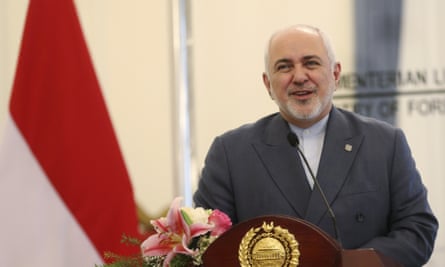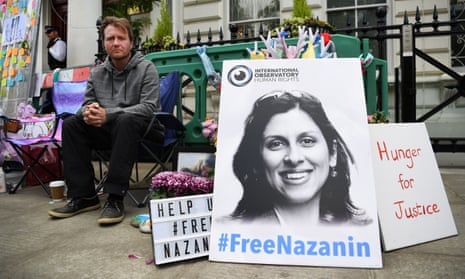Iran’s foreign minister, Mohammad Javad Zarif, has said the UK offered to release long-frozen Iranian funds in return for him intervening to help free the British-Iranian Nazanin Zaghari-Ratcliffe, detained in Iran for more than three years.
Zarif said the suggestion had first come from Philip Hammond, some time before he left the Foreign Office to become chancellor in July 2016. The funds involved were £400m owed by the UK for a decades-old tank sale. In return, the Iranian foreign minister said he was prepared to argue for Zaghari-Ratcliffe’s release at an Iranian court.
Zarif said the proposal remained on the table when Boris Johnson became foreign secretary, but his successor, Jeremy Hunt, abandoned it.
“Jeremy started talking about ‘you’re asking for ransom’. And I said: ‘Come on, this is not something that I started. This is something that Philip started,’” Zarif said. “Jeremy started to play tough because he wanted to become prime minister and it didn’t work out for anybody.”
Zarif said the release of funds would not have amounted to a ransom.
“As the foreign minister I do not have a standing in an Iranian court on any issue of somebody who is an Iranian citizen,” Zarif said. Iran does not recognise dual nationality in cases of Iranian nationals.
“I have a standing for any foreigner who is accused of spying. I have a standing when I say there is an exchange. That gives me a standing in a court. That gives me a way to intervene.”
The foreign minister said the subject came up in a recent phone conversation with the current UK foreign secretary, Dominic Raab, but with no conclusion.
“He [raised it] and I told him that there was an offer from their side which unfortunately hasn’t been fulfilled. Basically he made a statement and I made a rebuttal and then we said goodbye.”

Zaghari-Ratcliffe was in Iran to visit family when she was arrested in April 2016.
Her husband, Richard Ratcliffe, said: “Over the three and a half years Nazanin has been held, we have had many messages from Iranian authorities in private linking Nazanin’s imprisonment to the old arms debt. So I am glad that foreign minister Zarif has been so clear. Transparency has been a long time coming.”
Ratcliffe has previously raised concerns about his wife’s mental health under harsh prison conditions, and expressed fears she could take her own life.
“Of course this is not a dispute that Nazanin should have ever been tangled up in in the first place. But it is also extraordinary it has been allowed to last so long, and that the twists and turns of ministers’ actions have allowed it to get so much worse for Nazanin, and others taken, with us all just encouraged to quietly wait.”
Zarif said Iran had also been in negotiations with the US mediated by Switzerland over a possible exchange of prisoners but those talks had also stalled. “There is a proposal on the table with the United States. We exchanged the names through the Swiss. So we are ready,” Zarif said.
In the case of Zaghari-Ratcliffe, Zarif said he would have offered an exchange to the Iranian courts, which he described as an exchange of court decisions.
“Britain owes us that £400m for 40 years,” he told a group of reporters at the margins of the UN general assembly. “Nazanin is in prison based on a court decision. United Kingdom is supposed to give us money based on a court decision. Now they want us to reverse our court decision but they don’t want to implement their court decision. You see the irony?”
As relations worsen with the west, Iran has stepped up arrests of dual nationals and foreign visitors. This month, it emerged that two British-Australian dual nationals and an Australian had been detained.
One of the detainees, Kylie Moore-Gilbert, is a British-Australian lecturer at the University of Melbourne and has been held at the notorious Evin prison in Tehran for almost a year.
Another British-Australian woman, Jolie King, and her Australian boyfriend, Mark Firkin, have been held for the past 10 weeks. They were detained in Iran while on a trip around the world that they had been recording on social media.
British ministerial sources accepted there had been an agreement in principle between the Treasury and the Foreign Office for the payment to be made to the Iranians in line with the court judgment, but said the payment would probably have been made in the form of delivery of medicines.
The proposal met fierce resistance from the then defence secretary, Gavin Williamson, who pointed out a payment of £400m to the Iranian defence ministry at a time when the US was trying to squeeze the flow of funds to the Iranian Revolutionary Guards was not politically feasible.
One ministerial source said: “What Iran has done with Nazanin Zaghari-Ratcliffe is unconscionable, and she deserves to be released under Iranian law. But it is also true that Britain owes a debt to Iran under international law, and if we are ever to build a relationship of trust with Iran, this payment has to be made and it would be wise to do so. There is no reason for the payment of this debt to be linked to the release, even if it clearly is in the Iranians’ minds.”
The UK Foreign Office said in a statement: “We do not, and have never, accepted any suggestion that the UK would pay Iran to release UK nationals who have been arbitrarily detained. They must be released unconditionally. The UK will not be blackmailed, and the Foreign Minister’s comments only bring the Iranian government further into disrepute.
“We will highlight our concerns over innocent people being held in Iran without due judicial process at the UN this week.”
Suggestions by Zarif that Hunt refused to make the payment because of his Conservative leadership ambitions were dismissed by British officials as mischievous.
Efforts within the UK government were continuing over the payment as recently as a few months ago, but even ministers knowledgeable about the case, and broadly sympathetic to the Iranian argument over the outstanding debt, have privately said it is politically impossible to make the payment in the current context.
Richard Ratcliffe has flown to New York in an attempt to meet Zarif, who is there for the UN general assembly, and to launch a campaign called Families Alliance Against State Hostage Taking. The initiative includes other families of foreign and dual nationals held hostage in Iran.
“I have often said in the media, governments have an obligation to protect,” he said. “And for all of us in situations of profound distrust, protection lies in the rule of law. If the UK upholds its international legal obligations, it is more likely Iran will uphold its obligations – including human rights.”
